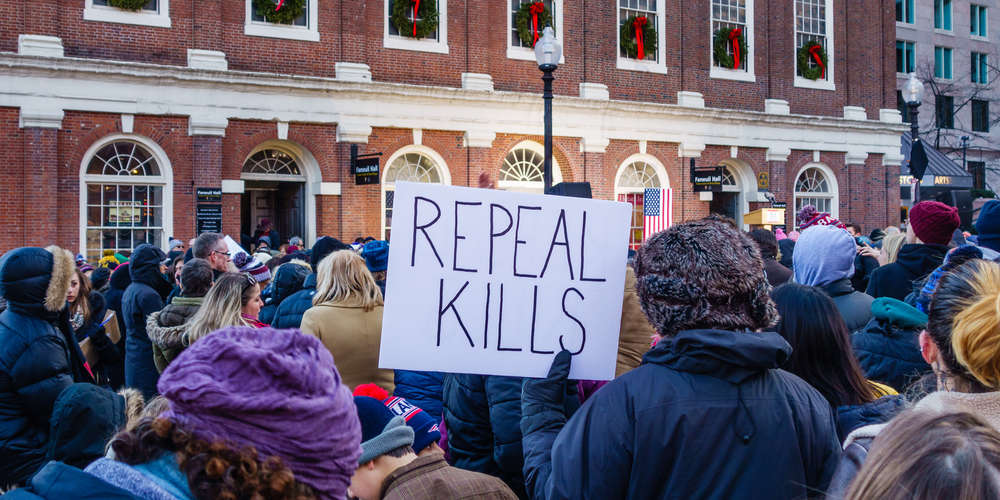Since bursting onto the political scene in the spring of 2020, Republican U.S. Rep. Lauren Boebert (R-CO) has been asked early and often about the Affordable Care Act (Obamacare) and whether she supports former President Donald Trump’s repeated efforts to repeal the increasingly popular healthcare law.
This week, a Boebert spokesperson once again offered a “no comment” on Trump’s recent promise to “never give up” on repealing the law that requires health insurance companies to cover preexisting medical conditions and allows young adults to stay on their parents’ plan until the age of 26. Affordable Care Act (ACA) benefits were also expanded and prescription drug pricing reduced by the Inflation Reduction Act, a law Boebert bitterly opposed last year.

While she’s taken to waffling on the ACA more recently, Boebert secured her spot on the general election ballot in 2020 by blasting her Republican primary opponent, U.S. Rep. Scott Tipton, for failing to kill Obamacare — and she was previously on the record opposing the law.
Trump, the Republican frontrunner in the 2024 presidential election, raised some eyebrows late last month by bringing up his 2017 failure to either repeal Obamacare or replace it with something better.
“The cost of Obamacare is out of control, plus, it’s not good Healthcare. I’m seriously looking at alternatives,” Trump wrote on social media. “We had a couple of Republican Senators who campaigned for 6 years against it, and then raised their hands not to terminate it. It was a low point for the Republican Party, but we should never give up!”
More than 40 million Americans now have coverage under the ACA, according to the U.S. Department of Health and Human Services, the highest total on record since the law was passed in 2010 and fully implemented in 2014. That includes members of Congress who, if they want subsidized coverage, are required to obtain a gold-level ACA plan and pay just 28% of the costs.
“I don’t spend a lot of time listening to Donald Trump, but I’m not sure what people are planning on replacing anything with,” Democrat Adam Frisch told Colorado Times Recorder in a recent phone interview. “A lot of people, including myself, are open to conversations about is there a better version of the existing system … but what’s going to plug in there? And to tear things down, especially something that’s as fundamental as healthcare, seems idiotic to me, if there’s nothing else to plug in there to make sure that everybody has access to some type of healthcare.”

Democratic frontrunner Frisch, an Aspen businessman, housing advocate, and former city council member who lost to Boebert by just 546 votes in 2022, said that over the past several weeks he’s been meeting with rural hospital CEOs in Moffat, Rio Blanco, Montezuma and other counties in the sprawling 3rd Congressional District that includes all or parts of 29 Colorado counties.
“You have housing costs, healthcare costs and childcare costs, and those three things are a triple whammy,” Frisch said of the Western Slope healthcare cost crisis plaguing residents for years. “There’s something to be said for the free-market aspect that I’m interested in. … We definitely want to make sure that people have choice and there’s not regulatory environments stopping insurance companies from being able to operate across state lines.”
Boebert frequently touts free-market solutions to lowering healthcare and health insurance costs in the district, but Frisch counters that can’t be the only approach. He advocates for propping up and enhancing the parts of the ACA that are working, and continuing to work on other cost-cutting solutions.
“No, you can’t just take something away and hope it just gets filled up by the free market,” Frisch said. “The healthcare system does not work that way. That’s somewhere between naive and dumb to assume that you just stop doing that and all of a sudden instantaneously something else pops in there.”
Frisch says the ACA is far from perfect, with premiums and deductibles that are still way too high, but he adds it will take bipartisan compromise to continue lowering costs and improving coverage for consumers in rural areas, where the volume of healthcare customers is very low compared to urban and suburban areas and it’s harder to attract healthcare workers.
“I would want to spend the majority of my time just trying to make sure that these county health departments and regional and small community hospitals are well-funded and well-supported,” Frisch said. “To me, that is the best way for southern and western Colorado to get looked after in the healthcare conversation. But to run around and say, ‘We’re going to tear up the whole thing and start from scratch, I’m missing that part.’”
Frisch also comes back to the fact that Boebert, a devoted Trump supporter, appears to be obsessed with what he calls the “anger-tainment” culture wars on social media instead of finding commonsense, bipartisan fixes for tough problems.
“At some point, these are complicated issues and they’re going to require some bipartisan solutions,” Frisch said. “Who do you want sitting down in the House of Representatives representing you and your family, your kids, your grandkids, your grandparents, your business and your community? Do you want her sitting down there or do you want me sitting down there working on these complicated issues?”
Other candidates seeking both the Democratic and Republican nominations to take on Boebert in the 2024 election did not respond to emails and phone calls seeking comment on Obamacare. Boebert for years has continued to dodge the topic, both prior to ousting Tipton and since then.
In a phone interview prior to the 2020 primary, Boebert said she and her contractor (and therefore not insured) oil worker husband had decided to go without health insurance – a huge financial risk in any industry – and just pay Obamacare’s tax penalties for remaining uninsured – penalties that have since been rescinded in Trump’s 2017 tax reform law.
“We’re a family of six and we haven’t had health insurance for, gosh, maybe three years, maybe more than that,” Boebert admitted in 2020. She’s since been divorced from her husband, who it later turned out was a highly-paid oil and gas consultant.
A Boebert spokesperson also declined to comment on the congresswoman’s current health insurance status for this story.
The CD3 race, which Frisch leads in fundraising and the most recent polling, is expected to be one of the most competitive in the nation next year, as is a race north of Denver where Republicans hope to unseat incumbent Democrat Yadira Caraveo, who recently sent the following email comment on the ACA via a spokesperson:
“Before I ran for elected office, I was a doctor,” Caraveo wrote. “I stood on the front lines of the healthcare crisis in this country. And I have seen firsthand the impact the Affordable Care Act has had to ensure working class families can see a doctor when they need one. While this law is by no means perfect, it was a huge step in the right direction – cutting the uninsured rate in half, and guaranteeing coverage regardless of pre-existing conditions. The former president’s recent comments are disturbing, particularly because, for over a decade now, Republicans have yet to present a viable alternative to the Affordable Care Act. I believe that no one in the wealthiest country in the world should be lying awake at night worried about whether they’ll be able to pay for the medical care they need. I look forward to using my position in Congress to continue to improve upon our system to ensure every family has affordable, accessible healthcare.”
Recognizing a potentially winning issue for Democrats next year, the administration of President Joe Biden last week issued a video statement with former President Barack Obama – the namesake champion of the ACA. None of Caraveo’s potential Republican opponents replied to emails requesting comment on this topic.





